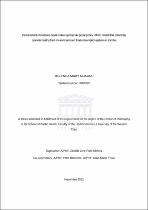| dc.contributor.advisor | Mchiza, Zandile June-Rose | |
| dc.contributor.author | Mukanu, Mulenga Mary | |
| dc.date.accessioned | 2023-05-15T11:06:36Z | |
| dc.date.available | 2023-05-15T11:06:36Z | |
| dc.date.issued | 2022 | |
| dc.identifier.uri | http://hdl.handle.net/11394/9966 | |
| dc.description | Philosophiae Doctor - PhD | en_US |
| dc.description.abstract | The double burden of malnutrition is a growing concern globally. In Zambia, it is estimated that of children under five years, 35% are stunted, while 5% are either overweight or obese. In the adult population, 24% are overweight, while 90% do not meet the dietary requirement of consuming five portions of fruit a day. Evidence suggests that unhealthy dietary habits developed by children can contribute to poor health outcomes in adulthood. However, Zambia's nutrition policies are not changing rapidly enough to address the development of new challenges associated with the double burden of malnutrition. Policy reforms should be implemented to re-engineer food environments to support access to healthier food options and make these foods preferable to consumers in critical age groups like adolescence. | en_US |
| dc.language.iso | en | en_US |
| dc.publisher | University of the Western Cape | en_US |
| dc.subject | Public health | en_US |
| dc.subject | Adolescents | en_US |
| dc.subject | Food security | en_US |
| dc.subject | Nutrition | en_US |
| dc.subject | Zambia | en_US |
| dc.title | Development of evidence-based context appropriate public policy reform models that coherently promote healthy food environments and food consumption patterns in Zambia | en_US |
| dc.rights.holder | University of the Western Cape | en_US |

